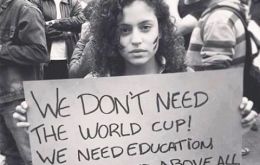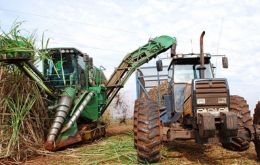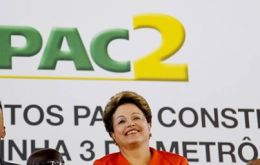MercoPress. South Atlantic News Agency
Tag: Dilma Rousseff re-election
-
Wednesday, June 4th 2014 - 08:37 UTC
Brazilians pessimistic about the economy and benefits from the World Cup

Brazilians pessimism about the future of the economy has increased considerably with just a few days left for the opening of the World Cup, according to a public opinion poll released by Pew Research.
-
Tuesday, May 27th 2014 - 09:49 UTC
Brazil central bank at a cross road: fosters growth or combats inflation

Analysts forecast Brazil's central bank will leave its benchmark interest rate unchanged at 11% this week, with the world's seventh-largest economy caught between rising inflation and sluggish growth. But given the persistence of inflation it should not come as a surprise if the monetary policy committee raises Selic to 11.25% after its two-day meeting this week.
-
Wednesday, May 7th 2014 - 07:22 UTC
Dilma pledges economic growth with contained inflation following negative stats

Brazilian president Dilma Rousseff said in a statement that her government ensures sustained economic growth, with contained inflation. The announcement followed market estimates saying that Brazil's GDP expansion this year would be down to 1.63%, below official and private recent estimates above 2%.
-
Thursday, May 1st 2014 - 07:08 UTC
Rousseff bids for re-election and announces benefits for her electoral base

President Dilma Rousseff said on Wednesday she will seek re-election in October, even though some are calling for the return of her popular predecessor president Lula da Silva. Rousseff, who belongs to Lula's Workers Party and was his protegée, said she hoped to have the support of all the parties allied with her government.
-
Thursday, April 10th 2014 - 06:28 UTC
Brazil's March inflation marks the steepest increase for the month since 2003

Brazil’s rate of inflation in March picked up at the quickest pace in 11 years for that month, challenging the central bank’s plan to stop raising interest rates soon and complicating President Dilma Rousseff chances of re-election.
-
Tuesday, April 8th 2014 - 00:14 UTC
Brazil will launch massive investment plan next August, two months ahead of election

Brazilian President Dilma Rousseff announced that the third stage of an investment plan, Growth Acceleration Program (PAC) will be launched in August, just two months ahead of an October presidential election in which she will seek re-election.
-
Monday, April 7th 2014 - 06:12 UTC
Brazil Rousseff support down ahead of October election, but rivals don't benefit

Brazilian President Dilma Rousseff's popularity has dipped five percentage points ahead of October's presidential elections, revealed a new poll published on Sunday. The Datafolha polling institute said 36% of respondents rated Rousseff's government as “great/good” against the 41% who gave it that rating in the firm's previous poll conducted in February.
-
Saturday, March 29th 2014 - 06:17 UTC
Support for Rousseff faltering, but still the strongest candidate for October's election

Support for Brazilian President Dilma Rousseff has faltered ahead of October's presidential election, a poll showed Thursday, although she remains a favorite to win a second term.
-
Tuesday, March 25th 2014 - 08:51 UTC
S&P downgrades Brazil’s sovereign debt rating to BBB minus

Standard & Poor's cut Brazil's sovereign debt rating closer to speculative territory in a blow to President Dilma Rousseff administration. Brazil had its long-term debt rating downgraded to BBB minus, the agency's lowest investment-grade rating. S&P changed its outlook to stable from negative, meaning further downgrades are unlikely for now, which will come as a relief for both politicians in Brasilia and financial markets.The move was widely expected but the timing surprised some investors.
-
Monday, March 10th 2014 - 21:43 UTC
Rousseff's supporters fit the most with the profile of the average Brazil voter

The average Brazilian voter for this coming October presidential election is between 25 and 34 years old, has on average a high school education and a low monthly family income, equivalent to 618 US dollars. He lives in the Southeast region of the vast country, in a small town with fewer than 50,000 inhabitants.
